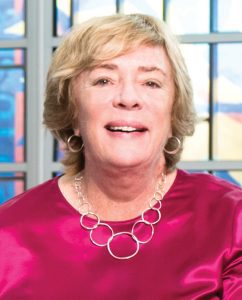As if women’s health concerns weren’t complicated enough, let’s throw in a pandemic that’s shaken up how we see, communicate with and access our healthcare providers. But what hasn’t changed in the Covid-19 era is the need to follow up with your medical providers for routine visits, and to check out any and all health concerns. Some of SJ’s top doctors are here to help you safely chart your next moves.
Screening for non-Covid concerns

Bill Muhr, MD
Covid screenings are a new fact of life, but other screenings that were cancelled in the spring due to the stay-at-home orders are just as important.
“We’ve flattened the curve and allowed the healthcare system to gear up for treating patients,” says Bill Muhr, MD, CEO of South Jersey Radiology (SJRA). “But if you don’t continue cancer screenings, you’re essentially trading one deadly disease for another.”
Muhr says SJRA now has a backlog of patients catching up on mammograms and other routine screenings.
“The earlier you find cancer, the less aggressive treatment you’ll need,” he says. “We fear that in the months we couldn’t screen women, any undetected cancers got more aggressive.”
Muhr is still concerned that some will delay mammograms, which they should get every year after 40, out of fear of contracting the virus at the doctor’s office. But there’s no need for that, he says.
“We do everything we know to do to keep this virus from spreading without sacrificing the care you need for other aspects of your health,” says Muhr.
Choices in the delivery room

Neely Elisha, DO
Nine months ago, the idea of women wearing masks while giving birth during a pandemic was the stuff of science fiction. But with Covid-19, a lot has changed.
“We do ask that women try to wear a mask during labor,” says Neely Elisha, DO, an Ob/Gyn at Inspira Medical Group Obstetrics and Gynecology. “But if it’s becoming a health concern for the mother, we don’t mandate it.”
Elisha has always spelled out what her patients should expect before they go into labor. The masks, PPE and other changes are now part of that conversation – especially if the mother has tested positive for Covid.
“She’ll have to stay in her room, and it’s recommended that we separate the baby to prevent the newborn from getting sick,” she says. “But there are options to keep the mom and baby safe without fully separating them.”
“As long as everyone is safe and healthy,” she adds, “that’s what matters.”
Health isn’t just medical

Lyle Back, MD
When New Jersey’s reopening cleared the way for elective procedures, appointments quickly filled for the likes of Botox, wrinkle fillers, facelifts and tummy tucks, says Lyle Back, MD, founder of the Cosmetic Surgery Center of Cherry Hill.
“Patients often say they feel like they aged 20 years in their divorce or when a family member passed away,” says Back. “It’s not just their imagination. Stressful life experiences affect us physically.”
“Coronavirus is no different,” he adds. “People have been in quarantine for months, and they’re scared. The stress of the pandemic is really showing on parts of the body like the neck, jawline, the deep lines around your eyes or mouth.”
The results of these procedures, he says, help them feel like they have some control back, especially now.
Cancer treatments can’t wait

Ana Maria Lopez, MD
Some treatments were too important to delay when the country shut down – like breast cancer therapies.
“We haven’t stopped treatment, but a lot has changed,” says Ana María López, MD, Jefferson Health’s vice chair of medical oncology and chief of cancer services at Sidney Kimmel Cancer Center – Washington Township. “We’ve started to think differently about the timelines and types of treatment.”
In the past, when a woman was diagnosed with early-stage breast cancer, surgery would have been scheduled immediately. But revised national guidelines prompted doctors to reschedule spring surgeries to a later date. In the interim, doctors have been providing alternative treatments, such as hormone blockade therapy, while they await their rescheduled surgery, she says.
What hasn’t changed is the need to be on the lookout for possible signs of cancer.
“Women’s cancers are any that affect women,” says López. “Just like we’re watching our cough, breath and temperatures for Covid, we need to watch for signs of all cancers.”
Maternal mental health

Caitlin French, MSN
Midwives typically perform a full scope of GYN services, including annual exams and helping women through menopause, but prenatal care has become a main priority, says Caitlin French, MSN, of Rowan Medicine Obstetrics and Gynecology.
“Pregnancy is not something you can push back for 3 months,” French says. “We’re monitoring patients more than ever through telehealth, but we’re seeing them in person much less.”
From what is understood about the virus now, there’s a low risk of passing the virus from mother to fetus. But even with added precautions, women often go twice as long between in-office visits, which can be a strain on mental health, French says.
“Women may feel separated from their care team or anxious from not hearing their baby’s heartbeat for a few weeks,” she adds. “With every headache or allergy they’re asking, ‘Is this normal? Is it the pregnancy, or is it the virus?’”
“Tools like telehealth counseling sessions, meditation apps, online yoga classes or even just going on a walk can ease that anxiety,” French says.
What’s keeping women up at night

Thanuja Hamilton, MD
Sleep is hard to come by these days, and the shut-eye you do get isn’t always restful.
“People are anxious,” says Thanuja Hamilton, MD, a sleep medicine specialist and owner of Advocare Sleep Physicians of South Jersey. “Stress of the virus is literally keeping people up at night.”
Self-medicating with alcohol and veering from normal routines are making it harder to fall asleep and stay asleep, she says. Plus, the lack of energizing activities during the day makes those quarantine dreams even crazier.
Hamilton found a few unexpected advantages to the increase in telehealth appointments. A peek over your shoulder at the TV on your bedroom wall or lack of window blinds tells her much of what she needs to know. Electronics before bed keep your brain stimulated when it should be relaxing.
“And please, shut off the news,” says Hamilton. “That doesn’t mean you shouldn’t stay informed, but take a break at least an hour before bedtime.”
Anxiety at home

Margaret Harbison, MD Photo: David Michael Howarth
The pandemic has turned slight “mommy guilt” into a mental-health crisis for some women quarantined at home with kids.
“Many of my patients from 15 years ago are now coming back to get help coping with everything going on,” says Margaret Harbison, MD, medical director at Centra Comprehensive Psychotherapy & Psychiatric Associates. One group stands out: moms with young kids.
“They feel like they’re irritable or short-tempered with their children. They can’t get enough work done but also aren’t spending enough time with their kids and still have to take care of the house,” she says.
Women tend to judge themselves harshly, thinking they’re the only ones who struggle, she says, but that isn’t true. She warns against falling into negative coping mechanisms like drinking, overeating or sleeping too much. Asking for help can go a long way.
Dreaded procedures

Stacey Zavala, MD
For women turning 50 in quarantine, a colonoscopy isn’t the ideal first post-Covid outing. But it’s not as bad as it seems, says Stacey Zavala, MD, a gastroenterologist at South Jersey Gastroenterology, and putting it off can be dangerous.
“A lot of times women are fearful, whether it’s taking the bowel prep, the anesthesia or they hear stories from their friends and family members,” she says. “But what’s worse is letting a cancer grow undetected that could have been easily treated.”
Colonoscopies allow doctors to find and remove polyps before they turn into cancer. But most women aren’t chomping at the bit to book their first appointment, she says.
“Colon cancer is the third most common cancer for women, and it’s highly preventable and treatable,” she says.
Knowing that it can be intimidating, Zavala lets patients know exactly what to expect so there are no surprises.
“Horror stories can be so exaggerated,” she says. “I don’t want them to fixate on someone else’s experience and put off an important procedure.”
Managing Menopause

Wendy Martinez, MD
Menopause is never a pleasant right of passage, and anxiety over Covid-19 is not making it any easier, says Wendy Martinez, MD, an Ob/Gyn at Advocare’s Women’s Group for OB/GYN.
“The virus has enhanced many menopausal symptoms,” she says. “The shutdown brought stress, sleep disturbances, depression and weight gain, which makes the change of life harder.”
Menopause symptoms like hot flashes, night sweats, depression and decreased metabolism create added complications in an already difficult time. The increased occurrences of diabetes and heart disease can put women at a higher risk of contracting the virus as well, she says. Sleep and weight changes are also problematic.
“Closed gyms and sleeping less from the stress is affecting women’s ability to lose weight,” she says. “Women typically gain weight during the change anyway, and even more now. It can be very upsetting.”
Hormone replacement therapy can help with that, Martinez explains. “But there are also things women can do at home to help manage their symptoms. Exercise, a healthy diet and increased hydration make a big difference.”














